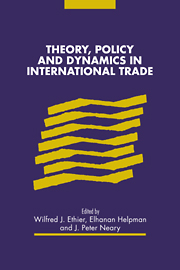Book contents
- Frontmatter
- Contents
- List of conference participants
- I Introduction
- II History, geography and the theory of trade
- 3 The hub effect: or, threeness in interregional trade
- 4 International trade and factor mobility with an endogenous land frontier: some general equilibrium implications of Christopher Columbus
- 5 Directions of lumpy country trade
- III The structure of simple trade models
- IV Policy towards international trade
- V Trade, growth and dynamics
- Index
4 - International trade and factor mobility with an endogenous land frontier: some general equilibrium implications of Christopher Columbus
Published online by Cambridge University Press: 16 March 2010
- Frontmatter
- Contents
- List of conference participants
- I Introduction
- II History, geography and the theory of trade
- 3 The hub effect: or, threeness in interregional trade
- 4 International trade and factor mobility with an endogenous land frontier: some general equilibrium implications of Christopher Columbus
- 5 Directions of lumpy country trade
- III The structure of simple trade models
- IV Policy towards international trade
- V Trade, growth and dynamics
- Index
Summary
Adam Smith devoted no less than fifty-six pages of his great treatise to the subject of “the Advantages which Europe has derived from the Discovery of America”, considering Columbus's voyages, and the almost contemporaneous journey to India around the Cape of Good Hope by Vasco da Gama, to be “the two greatest and most important events recorded in the history of mankind.” While the theme of the emergence and expansion of the “The Atlantic economy” has been one of the staple topics of economic historians it is surprising that it does not appear to have made much of an impression in the theoretical literature of international trade, perhaps because of the long Ricardian tradition of defining a “country” as a fixed bundle of resources existing independently of trade rather than as emerging in response to the opportunities opened up by trade itself.
An important feature of the Discoveries was that they should not be considered as having made available at an instant a large additional supply of land and other natural resources. Rather they opened up a new “frontier” where land could be extended indefinitely but only at a rising marginal cost in terms of other real resources. Wilderness had to be cleared before crops could be grown, harvested and gathered. The westward movement of this frontier provided the historian Frederick Jackson Turner (1861–1932) with his famous thesis that it was the influence of this factor that was the key to the experience of American history, accounting for such features as “rugged individualism,” democratic values and entrepreneurial vigor.
- Type
- Chapter
- Information
- Theory, Policy and Dynamics in International Trade , pp. 38 - 54Publisher: Cambridge University PressPrint publication year: 1993
- 5
- Cited by

